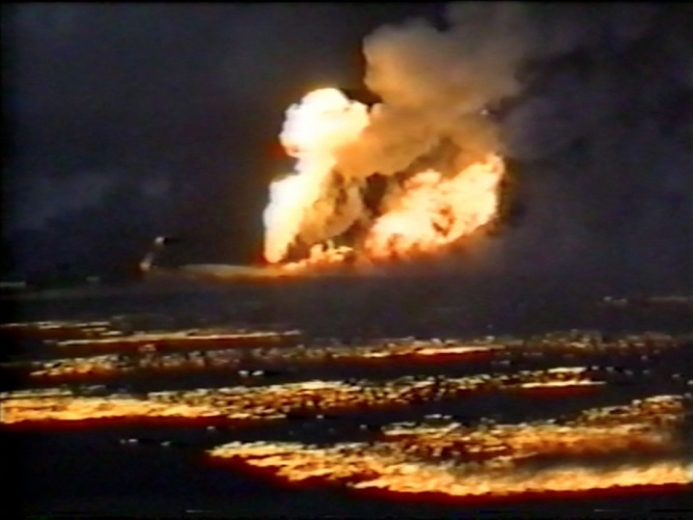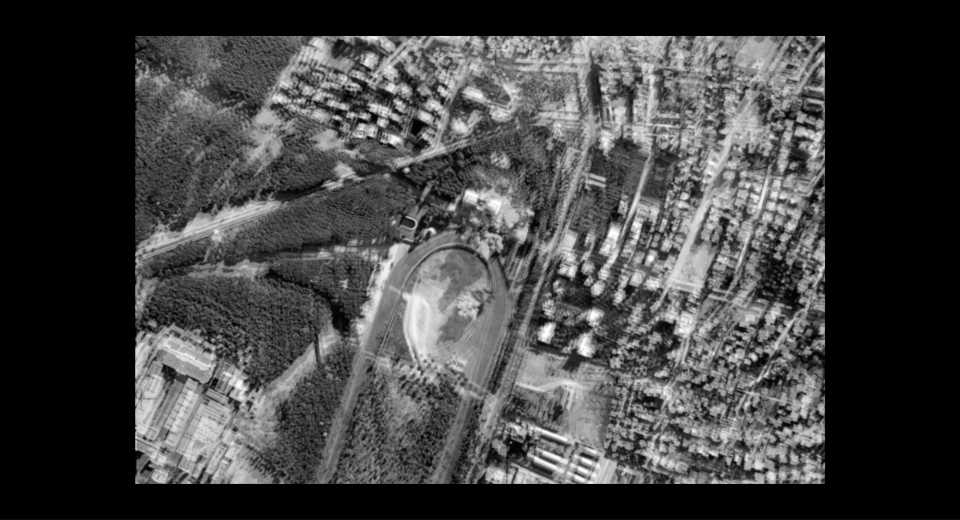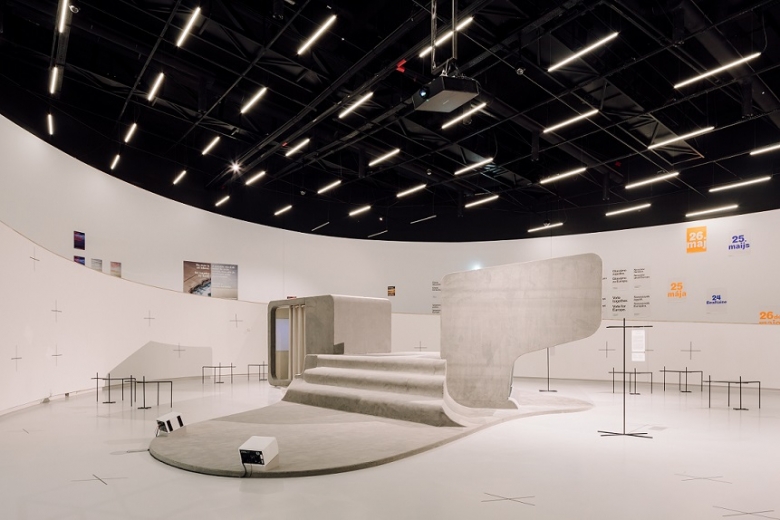
Cinematic Architectures [with]in Arab Geographies
A series of online talks
Curated by Róisín Tapponi
Programme maat x Art Jameel
Cinematic Architectures [with]in Arab Geographies is a series of open-ended online talks, released on maat ext., that focus on the role of the contemporary moving image and the production of space. The conversations are grounded within the contested borders of the so-called “Arab region”, and explore how human geographies, urban governance and architectural environments function in situ. Róisín Tapponi, curator of the cycle of films programmed to respond to the work Tactile Cinema (2021) by Bricklab, in the context of the exhibition X is Not a Small Country invites the prominent architectural and cinema researchers Ala Younis, Nora Akawi and Helene Kazan to navigate this terrain.
Talk #1
10/05/2021
Battles in a Future Estate
by Ala Younis
The art portraying Saddam Hussein in the Saddam Arts Centre, which stands in the middle of Haifa Street, covered almost the entire ground floor. The art in his palaces and scattered across the country were replicas of his face, and it is perhaps because of the appearance of this art in the street that the US military became convinced of its residents’ loyalty to the regime in 2003. The American cameras not only filmed their soldiers’ attacks but also depicted the residents in a single light – as terrorists. This presentation will attempt to single out mono-cultural practices and strategies as they inform military, artistic and architectural images. It will also attempt to historicise the fragmentation that inform these testimonies.
Ala Younis is a Kuwait-born artist, writer and curator. Her work has been featured in numerous exhibitions, including solo shows at Darat al Funun, Jordan (2009); Delfina Foundation, London (2010); and MMAG Foundation, Jordan (2017). Selected group shows include CCS Bard Galleries, New York (2017); Akademie der Künste, Berlin (2017); Guggenheim Museum, New York (2016); the Venice Biennale (2015); New Museum, New York (2012 and 2014); the Gwangju Biennale (2012); and the Istanbul Biennial (2011). As a curator, Younis organised the first Kuwaiti Pavilion at the 55th Venice Biennale; interventions by the Museum of Manufactured Response to Absence in Algeria, Kuwait and Ramallah; and other exhibitions in Egypt, France, Jordan and the UAE. She holds a BSc in Architecture from the University of Jordan and an MRes in Visual Cultures from Goldsmiths, University of London. She sits on the Advisory Board of Berlinale’s Forum Expanded and is a co-founder of the non-profit publishing initiative Kayfa ta.
Talk #2
23/06/2021
Frames of (Un)Accountability
by Helene Kazan
During the Second World War, the first widespread use of aerial bombardment was legitimised through the legal construct of "military necessity". Archival evidence from the British government charts neo-colonial strategies and interventions during this time of destruction and development across Lebanon, Syria, Palestine, Iraq, Egypt and Jordan. In this lecture, Helene Kazan traces the human and non-human effects of this, in the attempt at placing accountability and dismantling the ongoing capacity of law as structural violence. The designed nature of this legal technology is unpacked through a decolonial archival and filmic investigation into the little-known events that took place in the Allied invasion into Vichy French controlled Lebanon and Syria in 1941.
Helene Kazan is an artist and writer. Her research-based practice investigates “risk” in Lebanon through an analysis of international law, architecture and the human experience of violence as observed and expounded through the frame of “poetic testimony”. Kazan further explores how violence is traced through the architecture of the lived-built environment as a material sensor of an evolving integrated limit condition of conflict and capitalism. Kazan received the CHASE/AHRC award for her PhD at the Centre for Research Architecture at Goldsmiths, University of London. She was a Research Fellow at Forensic Architecture, Goldsmiths, University of London (2021–2015), and also a recipient of the 2018–2020 Vera List Center Fellowship at The New School, New York. She lectures at Oxford Brookes University and at the Royal College of Art, London.
Talk #3
Date to be announced
Nora Akawi is an architect and curator currently living in New York. She is the director of Studio-X Amman, a platform for public programming, research and education on architecture in the Arab region, initiated by Columbia University’s Graduate School of Architecture, Planning and Preservation and the Columbia Global Center in Amman. She lectures on borderlands, forced displacements and counter-mapping at Columbia University’s GSAPP. Akawi co-curated the Bahrain Pavilion exhibition for the Biennale Architettura 2018 in Venice, and co-edited the books Friday Sermon and The Arab City: Architecture and Representation. She is a member of the affiliated faculty at the Center for Palestine Studies at Columbia University and sits on the steering committee for the Sijal Institute for Arabic Language and Culture in Amman. She graduated in Architecture in Palestine in 2009 and in 2011 completed an MSc in Critical, Curatorial and Conceptual Practices in Architecture at Columbia University.

